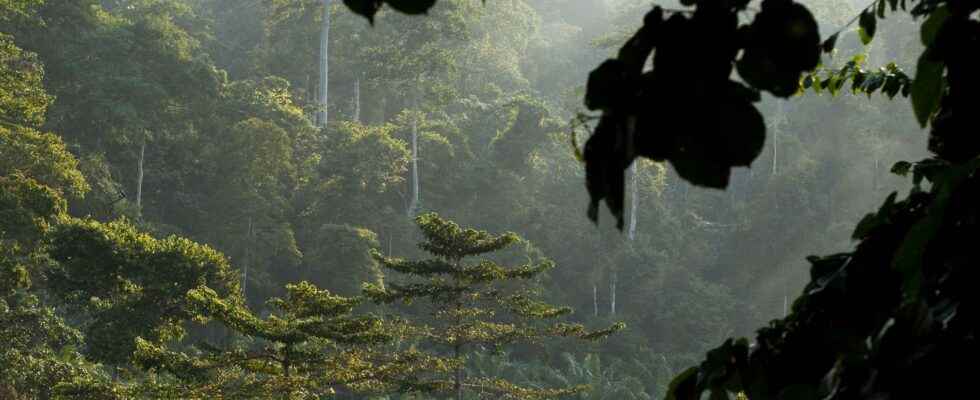Published: Less than 30 min ago
full screen
Next
The rainforests bind large amounts of carbon. Archive image.
1 of 2 Photo: Olivier Asselin/AP/TT
Stopping deforestation is crucial to keeping global warming down. Now 27 countries promise to increase efforts globally, but Sweden should do more at home, an expert believes.
If the devastation of forests does not stop, it is not possible to reach the goals of the Paris Agreement, according to the UN.
– Deforestation must be reduced to almost zero to give us the best chance of keeping warming below 1.5 degrees and avoiding the worst climate consequences for the world, says Toby Gardner, researcher at the Stockholm Environment Institute.
Deforestation means that forests are converted into fields or pastures, for example, and is a major problem in a climate context. The trees act as storage sites for carbon, and when they are cut down or burned, carbon dioxide is released into the atmosphere.
“Stop the Chainsaw Massacre”
At last year’s climate meeting in Glasgow, an important step was taken when roughly 140 countries pledged to stop deforestation by 2030 – or “put an end to the global chainsaw massacre” as British Prime Minister Boris Johnson, host of the meeting, put it.
Even Brazil, which is rapidly transforming the Amazon into, among other things, a giant soy plantation, signed the agreement, which is also considered important for preserving ecosystems and endangered animal and plant species.
Since then it has been slow. According to a UN report released ahead of the ongoing COP27 climate summit in Egypt, the world is “not on track” to meet the deforestation target: Few countries have stepped up their action and sufficient funding is lacking.
Keep the promise
A glimmer of light during the meeting in Egypt is that 27 countries, including Sweden, formed a group that commits to act to keep the promise from last year.
– It is a very welcome initiative, but how it will work in practice and where the money will come from is still unclear, says Toby Gardner.
However, the three largest rainforest nations – Brazil, Congo and Indonesia – have not joined the group, but have moved up positions nonetheless. The three countries recently pledged to start working together to preserve the forests and to develop a financing mechanism to help developing countries keep the trees standing.
And Brazil’s newly elected president Lula da Silva drew applause when, in a speech at COP27 on Wednesday, he promised to wage “a big fight” against deforestation, a clear turnaround from predecessor Bolsonaro.
Sweden must influence others
When it comes to Sweden’s role in the group formed during the climate meeting, the focus is above all on collaborating internationally to reduce deforestation in other countries, according to Emilie Molin, who is chancellor for forest affairs at the Ministry of Economy and Trade and who is participating in the negotiations at COP27.
– Some issues overlap with EU policy and are handled jointly within the EU. But in addition to that, the government sees opportunities for cooperation in circular bioeconomy and rural development, she says.
It is roughly about increasing reuse, and about how people who live near forests should find other livelihoods than agriculture, as the conversion of forests to agricultural land is often the culprit in the drama.
“Not in by back yard”
In Sweden, almost no regular deforestation takes place in the way that forests are cut down to become, for example, arable land. At the same time, many of Sweden’s old-growth forests are a thing of the past, and that trend continues: In the 2070s, the last old and unprotected forests are estimated to be gone if clear-cutting continues at the same rate as today, according to new research from the universities of Umeå and Lund.
And even if new forest is planted when the old one is cut down, it affects ecosystems and biodiversity, points out Peter Roberntz, forest expert at the World Wide Fund for Nature (WWF).
At the same time that Sweden is pushing to reduce deforestation in other countries, old natural forests should be preserved at home, he believes.
– Otherwise it will be a bit of “not in my back yard”: Feel free to protect forests elsewhere, but not here.
Do more
Toby Gardner at the Stockholm Environment Institute also thinks that Sweden can do more to put an end to global devastation. As an example, he mentions that Sweden, unlike Norway and Denmark, has not joined the so-called Amsterdam Declaration, which is supposed to put an end to the trade in forest and agricultural products from deforested areas.
– In general, Sweden, which is a forest-dependent nation, should be able to play a greater role on the world stage and influence other countries in the right direction.
Facts
Deforestation
Between 1990 and 2020, 420 million hectares of forest were lost due to deforestation worldwide, equivalent to the entire surface of the EU, according to the UN’s Food and Agriculture Organization (FAO).
Agriculture (mainly the cultivation of palm oil and soybeans), grazing and urbanization are the main causes of deforestation.
The group that 27 countries formed during COP27, “Forest and climate leaders Partnership” (FCLP), is supposed to unite measures from governments, companies and other social leaders.
Source: FAO
Read more
